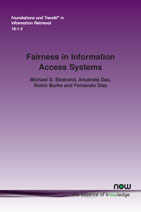Fairness in Information Access Systems
By Michael D. Ekstrand, People and Information Research Team (PIReT), Boise State University, USA, ekstrand@acm.org | Anubrata Das, School of Information, University of Texas at Austin, USA, anubrata@utexas.edu | Robin Burke, Department of Information Science, University of Colorado, USA, robin.burke@colorado.edu | Fernando Diaz, Mila - Quebec AI Institute, Canada, diazf@acm.org
Abstract
Recommendation, information retrieval, and other information access systems pose unique challenges for investigating and applying the fairness and non-discrimination concepts that have been developed for studying other machine learning systems. While fair information access shares many commonalities with fair classification, there are important differences: the multistakeholder nature of information access applications, the rank-based problem setting, the centrality of personalization in many cases, and the role of user response all complicate the problem of identifying precisely what types and operationalizations of fairness may be relevant.
In this monograph, we present a taxonomy of the various dimensions of fair information access and survey the literature to date on this new and rapidly-growing topic. We preface this with brief introductions to information access and algorithmic fairness to facilitate the use of this work by scholars with experience in one (or neither) of these fields who wish to study their intersection. We conclude with several open problems in fair information access, along with some suggestions for how to approach research in this space.
Fairness in Information Access Systems
Recommendation, information retrieval, and other information access systems pose unique challenges for investigating and applying the fairness and non-discrimination concepts that have been developed for studying other machine learning systems. While fair information access shares many commonalities with fair classification, there are important differences such as the multistakeholder nature of information access applications, the rank-based problem setting, the centrality of personalization in many cases, and the role of user response. These all complicate the problem of identifying precisely what types and operationalizations of fairness may be relevant.
In this monograph, the authors present a taxonomy of the various dimensions of fair information access and survey the literature to date on this new and rapidly-growing topic. They preface this with brief introductions to information access and algorithmic fairness to facilitate the use of this work by scholars who wish to study their intersection. The authors conclude with several open problems in fair information access and present suggestions for how to approach research in this space.
